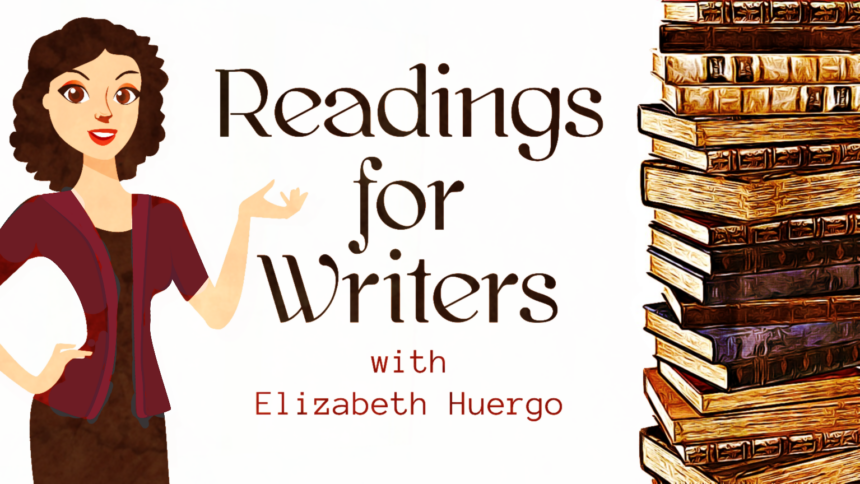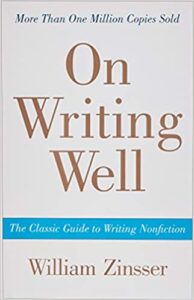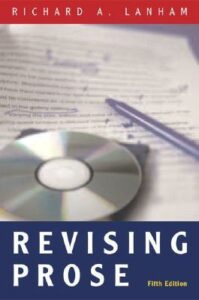Readings for Writers: On Writing (and Revising) Well
By Elizabeth Huergo | July 26, 2022 |
 William Zinsser’s On Writing Well: The Classic Guide to Writing Nonfiction is one of those resources that can be found on the bookshelves of so many writers and students of writing. Assigned to teach an undergraduate grammar course this next academic year, I placed it on the list of required texts. I want my students to understand grammar in a broader context–not simply as the equivalent of a driving manual filled with rules to memorize but as a set of tools for developing voice and ultimately for developing a sense of purpose. For Zinsser there is a “personal transaction” that forms the core of good writing. “Good writing,” he explains, “has an aliveness that keeps the reader reading from one paragraph to the next, and it’s not a question of gimmicks to ‘personalize’ the author.” For Zinsser “clarity” and “strength” are at the core of good writing.
William Zinsser’s On Writing Well: The Classic Guide to Writing Nonfiction is one of those resources that can be found on the bookshelves of so many writers and students of writing. Assigned to teach an undergraduate grammar course this next academic year, I placed it on the list of required texts. I want my students to understand grammar in a broader context–not simply as the equivalent of a driving manual filled with rules to memorize but as a set of tools for developing voice and ultimately for developing a sense of purpose. For Zinsser there is a “personal transaction” that forms the core of good writing. “Good writing,” he explains, “has an aliveness that keeps the reader reading from one paragraph to the next, and it’s not a question of gimmicks to ‘personalize’ the author.” For Zinsser “clarity” and “strength” are at the core of good writing.
 Divided into four parts, On Writing Well begins with a discussion of these two core “Principles,” with Zinsser evoking George Orwell’s “Politics and the English Language,” and then offering more recent examples of the “clutter,” the “verbal camouflage” that is especially evident in business and politics. Although Zinsser sees his work as a “complement” to Strunk & White’s The Elements of Style, his discussion of writing reminds me of the work of Richard Lanham, who, echoing similar ideas, offers a rather handy method for revising prose.
Divided into four parts, On Writing Well begins with a discussion of these two core “Principles,” with Zinsser evoking George Orwell’s “Politics and the English Language,” and then offering more recent examples of the “clutter,” the “verbal camouflage” that is especially evident in business and politics. Although Zinsser sees his work as a “complement” to Strunk & White’s The Elements of Style, his discussion of writing reminds me of the work of Richard Lanham, who, echoing similar ideas, offers a rather handy method for revising prose.
In Revising Prose, Lanham asks what appears at first to be a simple question: “Who is doing what?” Here is one of Lanham’s examples of “Official Style” and its revision using what he terms The Paramedic Method (PM):
[Official Style]
The establishment of an error detection mechanism is necessary to establish a sense of independence in our own movement planning and correction.
[Revision]
Unless we know we are doing something wrong, we can’t correct it.
One important point to observe is how Lanham focuses on the main subject and verb: establishment is. Notice that he switches out the abstract noun (“establishment”) with a more human pronoun (“we”). He also switches up the verb, making it less passive: “is” becomes “can’t correct.” Another important point reveals the conscious presence of the writer. Lanham chooses to subordinate one idea to the other: “Unless we know…, we can’t correct.” He makes a decision that helps his readers understand how the absence of one thing influences another. In the process, he also creates a lovely cadence. Don’t believe me? Try reading both examples out loud with feeling. What do you hear? At what points are you able to rest and take a breath?
This is so much fun! Please indulge me in another example of Lanham’s PM:
[Official Style]
Pelicans may also be vulnerable to direct oiling, but the lack of mortality data despite numerous spills in areas frequented by the species suggests that it practices avoidance.
[Revision]
Pelicans seem to survive oil spills by avoiding the oil.
 Here again Lanham focuses on the axis of the sentence, its main subject and verb. Here again he is consciously present. What strikes me, however, is what I can only call the moral core of the sentence, the sentence Lanham has lifted in situ like a forensic archeologist revealing a bone fragment at a mass grave. Hearkening back to Orwell, the revised sentence requires us to see something unpleasant and to consider our own culpability in the struggle of pelicans to survive an oil spill. “Pelicans seem to survive.” (In the absence of data, do we actually know?) The revision demands that we see and reflect on one of the many, many injustices of this world. That demand is not, as Zinsser might say, “a question of gimmicks to ‘personalize’ the author.” The revision (a clearer, stronger version of the original) places the emphasis on the reader as recipient and not the author.
Here again Lanham focuses on the axis of the sentence, its main subject and verb. Here again he is consciously present. What strikes me, however, is what I can only call the moral core of the sentence, the sentence Lanham has lifted in situ like a forensic archeologist revealing a bone fragment at a mass grave. Hearkening back to Orwell, the revised sentence requires us to see something unpleasant and to consider our own culpability in the struggle of pelicans to survive an oil spill. “Pelicans seem to survive.” (In the absence of data, do we actually know?) The revision demands that we see and reflect on one of the many, many injustices of this world. That demand is not, as Zinsser might say, “a question of gimmicks to ‘personalize’ the author.” The revision (a clearer, stronger version of the original) places the emphasis on the reader as recipient and not the author.
Brevity can be a friend of clarity, but the two should never be yoked in marriage. Neither Zinsser nor Lanham makes the reductive argument that short sentences are best. Revision helps locate and clarify the main idea in a sentence. It helps sort out major points from minor ones. It also helps identify the catastrophic absence of an idea. In fact, periodic sentences can be quite beautiful in structure and clear in meaning. Within their complexity, ideas are introduced, developed, concluded; visual and aural (relating to the sense of hearing) rhythms and patterns are set in motion; and readers are led through the writer’s thinking process by the writer in a highly controlled manner.
The third section of On Writing Well is my favorite. Here Zinsser offers an important history of how, in the US, non-fiction genres were often not considered literature the way novels, short-stories, and plays are. As he explains,
“If nonfiction is where you do your best writing, or your best teaching of writing, don’t be buffaloed into the idea that it’s an inferior species. The only important distinction is between good writing and bad writing. Good writing is good writing, whatever form it takes and whatever we call it.”
The circular reasoning aside, his willingness to embrace a range of genres is admirable, as is his discussion of the points these different genres hold in common. Genre shouldn’t be a prison so much as an expressive possibility, a medium through which a writer expresses ideas.
In the fourth part of On Writing Well, in the section titled “The Tyranny of the Final Product, Zinsser discusses pedagogy. I envy the many students who sat in his class. By his own account, he emphasized the link between writing and the quest for identity, writing and the intention to discover something about the world and ourselves. Don’t focus on the end-product–the manuscript or the paycheck. Focus on the intention and the quest. Do so with “integrity and humanity.” Is there better advice to be found anywhere?
Do you allow yourself enough time to revise? Is revision a distinct phase in your writing process? Did you have a favorite writing teacher at any point in your life?
[coffee]









Hello Elizabeth. Anyone who lobbies writers to read On Writing Well is doing good. At the end of your post, you tell how Zinsser asked his students to think of writing as a quest for identity. How true. Writers can’t help revealing themselves in what they write, both to others and themselves. I also used Zinsser’s book in the classroom, and I called on my students to ask themselves this: have you let your ego get in the way of clarity? Have you taken pride in the wrong things? The examples you provide illustrate this perfectly. “Error detection mechanism” for example. But the sad truth is that many careers actually require this kind of thing. An office mate of mine had a scholarly article rejected by an academic publication for lawyers. The rejection letter–I’m not making this up–said his article was too easy to understand. He was urged to rewrite the thing to sound “more professional,” and re-submit it. Sigh.
Barry, your friend’s experience was exactly like mine. I wrote fiction all my life and creative writing teachers loved it. So I was surprised after writing my first paper at new job for research and development software engineering, how appalled senior management reacted. The word “we” was too personal. My before versions read like the after versions here, but that is not what they considered technical reporting. They would have loved the first versions of these samples.
My take-away is know your reader.
Yes, know your reader. With my office mate and with you as a technical writer, that reader was in charge, and not at all interested in clarity or concision. I guess it’s called earning a living.
Along similar lines and a classic that’s out-of-print but still can be found is The Technique of Clear Writing by Gunning.
Aside from Zinsser’s book, another good one is (was?) Ken Macrorie’s “Writing to Be Read.” (The title alone is worth the price of the book.)
Over on Quora, I once did a sort of reverse version of of “Writing Well.” It answered somebody’s question, “What is a more formal way of saying “I will keep you updated”? A fun exercise!
Oh, Elizabeth, I will have to order this book. Sounds fascinating. Thanks!
Yours,
Dee
But if we remove all those abstract nouns and passive voices, what’s left to hide behind? And you’d have to know what you’re trying to say! That’s not fair to those, who, in print, aren’t trying to say anything. Or to those who seek to elevate their opinions above the value of the ideas they espouse. Or almost espouse. Or seem to espouse.
I can’t remember who said words to the effect that, in the course of revising, if anything in his MS read like ‘writing’, he’d rip it out and start over.
Great post. A call for clarity and honesty. Perhaps they are the unspoken foundation of good writing.
“If it sounds like writing, I rewrite it.” Elmore Leonard. That might be the quote you had in mind, Bob, but yours is more dramatic.
Thank you Elizabeth for this post, which sent me directly to my shelf of writing books to revisit On Writing Well. An eminently readable writer himself, William Zinsser has long been my favorite “coach.” One of his caveats from On Writing Well sums up the points you have highlighted here: “Never say anything in writing that you wouldn’t comfortably say in conversation.”